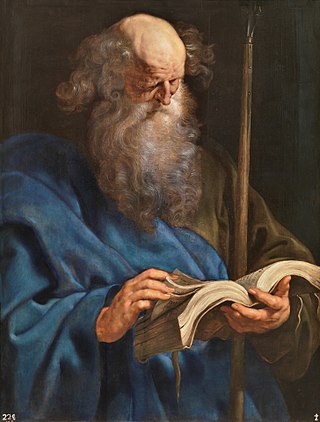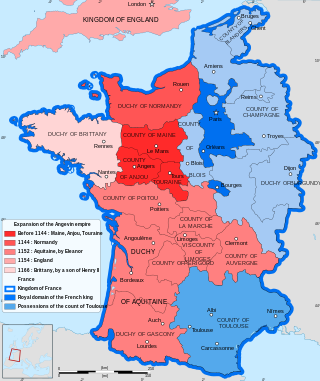Related Research Articles

Saint George, also George of Lydda, was a Christian who is venerated as a saint in Christianity. According to tradition, he was a soldier in the Roman army. He was of Cappadocian Greek origin and a member of the Praetorian Guard for Roman emperor Diocletian, but was sentenced to death for refusing to recant his Christian faith. He became one of the most venerated saints and megalomartyrs in Christianity, and he has been especially venerated as a military saint since the Crusades. He is respected by Christians, Druze, as well as some Muslims as a martyr of monotheistic faith.

Thomas the Apostle, also known as Didymus, was one of the Twelve Apostles of Jesus according to the New Testament. Thomas is commonly known as "Doubting Thomas" because he initially doubted the resurrection of Jesus Christ when he was told of it ; he later confessed his faith on seeing the wounds left over from the crucifixion.

Pope Eleutherius, also known as Eleutherus, was the bishop of Rome from c. 174 to his death. His pontificate is alternatively dated to 171-185 or 177-193. He is venerated as a saint in the Catholic Church.

James the Great was one of the Twelve Apostles of Jesus. According to the New Testament, he was the second of the apostles to die, and the first to be martyred. Saint James is the patron saint of Spain and, according to tradition, his remains are held in Santiago de Compostela in Galicia.

Denis of Paris was a 3rd-century Christian martyr and saint. According to his hagiographies, he was bishop of Paris in the third century and, together with his companions Rusticus and Eleutherius, was martyred for his faith by decapitation. Some accounts placed this during Domitian's persecution and incorrectly identified St Denis of Paris with the Areopagite who was converted by Paul the Apostle and who served as the first bishop of Athens. Assuming Denis's historicity, it is now considered more likely that he suffered under the persecution of the emperor Decius shortly after AD 250.
Constance of Hauteville (1128–1163) was the ruling princess of Antioch from 1130 to 1163. She was the only child of Bohemond II of Antioch and Alice of Jerusalem. Constance succeeded her father at the age of two after he fell in battle, although his cousin Roger II of Sicily laid claim to Antioch. Alice assumed the regency, but the Antiochene noblemen replaced her with her father, Baldwin II of Jerusalem. After he died in 1131, Alice again tried to take control of the government, but the Antiochene barons acknowledged the right of her brother-in-law Fulk of Anjou to rule as regent for Constance.

Lucius was a supposed 2nd-century king of the Britons traditionally credited with introducing Christianity into Britain. Lucius is first mentioned in a 6th-century version of the Liber Pontificalis, which says that he sent a letter to Pope Eleutherius asking to be made a Christian. The story became widespread after it was repeated in the 8th century by Bede, who added the detail that after Eleutherius granted Lucius' request, the Britons followed their king in conversion and maintained the Christian faith until the Diocletianic Persecution of 303. Later writers expanded the story, giving accounts of missionary activity under Lucius and attributing to him the foundation of certain churches.
Eleutherius, Eleutherus or Eleuterus may refer to:

Raymond du Puy (1083–1160) was a knight from Dauphiné in France and the second Grand Master of the Knights Hospitaller, also known as the Order of St. John of Jerusalem, from around 1121 until 1160. Officially, he succeeded Blessed Gerard, the founder of the Order, as Grand Master. While traditionally cited as the direct successor upon Gerard's death in 1118 or 1120, his assumption of the magisterium was in 1121 or 1123 after one or two interim superiors, Pierre de Barcelona and Boyant Roger. Raymond divided the membership of the Order into clerical, military, and serving brothers and established the first significant Hospitaller infirmary near the Church of the Holy Sepulchre in Jerusalem.
Saint Eleutherius may refer to:

Saint Liberalis of Treviso is a saint of the 4th century. Tradition states that he was a priest who opposed Arianism and that he was persecuted at Ancona.

Rocca di Botte is a comune and town of 860 people in the province of L'Aquila, Abruzzo, central Italy.
Rocca d'Arce is a comune (municipality) in the Province of Frosinone in the Italian region Lazio, located about 100 kilometres (62 mi) southeast of Rome and about 20 kilometres (12 mi) southeast of Frosinone.

Saint Eleutherius of Tournai is venerated as a saint and considered the first bishop of Tournai. The Catholic Encyclopedia writes that "historically there is very little known about St. Eleutherius, but he was without doubt the first Bishop of Tournai."

Eleutherius (or Eleut erus or Eleftherios; sometimes called Liberalis or Liberator, the former transliterations and the latter translations of his and his mother Antia are venerated as Christian saints and martyrs in Greece and Albania.

The County of Anjou was a French county that was the predecessor to the Duchy of Anjou. Its capital was Angers, and its area was roughly co-extensive with the diocese of Angers. Anjou was bordered by Brittany to the west, Maine to the north, Touraine to the east and Poitou to the south. Its 12th century Count Geoffrey created the nucleus of what became the Angevin Empire. The adjectival form is Angevin, and inhabitants of Anjou are known as Angevins. In 1360, the county was raised into the Duchy of Anjou within the Kingdom of France. This duchy was later absorbed into the French royal domain in 1482 and remained a province of the kingdom until 1790.

October 13 - Eastern Orthodox liturgical calendar - October 15

Stephen is traditionally venerated as the protomartyr or first martyr of Christianity. According to the Acts of the Apostles, he was a deacon in the early Church at Jerusalem who angered members of various synagogues by his teachings. Accused of blasphemy at his trial, he made a speech denouncing the Jewish authorities who were sitting in judgment on him and was then stoned to death. Saul of Tarsus, later known as Paul, a Pharisee and Roman citizen who would later become a Christian apostle, participated in Stephen's martyrdom.

Deruvian, also known by several other names including Damian, was a possibly legendary 2nd-century bishop and saint, said to have been sent by the pope to answer King Lucius's request for baptism and conversion to Christianity. Together with his companion St Fagan, he was sometimes reckoned as the apostle of Britain. King Lucius's letter may represent earlier traditions but does not appear in surviving sources before the 6th century; the names of the bishops sent to him does not appear in sources older than the early 12th century, when their story was used to support the independence of the bishops of St Davids in Wales and the antiquity of the Glastonbury Abbey in England. The story became widely known following its appearance in Geoffrey of Monmouth's History of the Kings of Britain. This was influential for centuries and its account of SS Fagan and Deruvian was used during the English Reformation to support the claims of both the Catholics and Protestants. Christianity was well-established in Roman Britain by the third century. Some scholars therefore argue the stories preserve a more modest account of the conversion of a Romano-British chieftain, possibly by Roman emissaries by these names.
Arce or Arze is a Spanish and also Basque surname but may also refer to the given name popular in the Levant.
References
- ↑ "St. Eleutherius of Rocca d'Arce". Catholic Online. Retrieved 21 April 2016.
- ↑ "Book of Saints – Eleutherius – 29 May". Catholicsaints.Info. Retrieved 21 April 2016.